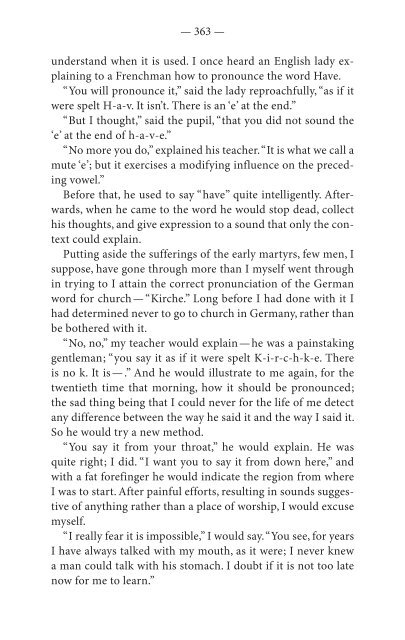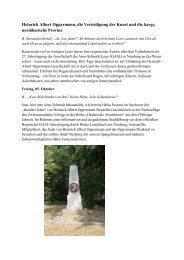Three Men in a Boat / Three Men on the Bummel
Three Men in a Boat / Three Men on the Bummel
Three Men in a Boat / Three Men on the Bummel
You also want an ePaper? Increase the reach of your titles
YUMPU automatically turns print PDFs into web optimized ePapers that Google loves.
— 363 —<br />
understand when it is used. I <strong>on</strong>ce heard an English lady expla<str<strong>on</strong>g>in</str<strong>on</strong>g><str<strong>on</strong>g>in</str<strong>on</strong>g>g<br />
to a Frenchman how to pr<strong>on</strong>ounce <strong>the</strong> word Have.<br />
“You will pr<strong>on</strong>ounce it,” said <strong>the</strong> lady reproachfully, “as if it<br />
were spelt H-a-v. It isn’t. There is an ‘e’ at <strong>the</strong> end.”<br />
“But I thought,” said <strong>the</strong> pupil, “that you did not sound <strong>the</strong><br />
‘e’ at <strong>the</strong> end of h-a-v-e.”<br />
“No more you do,” expla<str<strong>on</strong>g>in</str<strong>on</strong>g>ed his teacher. “It is what we call a<br />
mute ‘e’; but it exercises a modify<str<strong>on</strong>g>in</str<strong>on</strong>g>g <str<strong>on</strong>g>in</str<strong>on</strong>g>fluence <strong>on</strong> <strong>the</strong> preced<str<strong>on</strong>g>in</str<strong>on</strong>g>g<br />
vowel.”<br />
Before that, he used to say “have” quite <str<strong>on</strong>g>in</str<strong>on</strong>g>telligently. Afterwards,<br />
when he came to <strong>the</strong> word he would stop dead, collect<br />
his thoughts, and give expressi<strong>on</strong> to a sound that <strong>on</strong>ly <strong>the</strong> c<strong>on</strong>text<br />
could expla<str<strong>on</strong>g>in</str<strong>on</strong>g>.<br />
Putt<str<strong>on</strong>g>in</str<strong>on</strong>g>g aside <strong>the</strong> suffer<str<strong>on</strong>g>in</str<strong>on</strong>g>gs of <strong>the</strong> early martyrs, few men, I<br />
suppose, have g<strong>on</strong>e through more than I myself went through<br />
<str<strong>on</strong>g>in</str<strong>on</strong>g> try<str<strong>on</strong>g>in</str<strong>on</strong>g>g to I atta<str<strong>on</strong>g>in</str<strong>on</strong>g> <strong>the</strong> correct pr<strong>on</strong>unciati<strong>on</strong> of <strong>the</strong> German<br />
word for church — “Kirche.” L<strong>on</strong>g before I had d<strong>on</strong>e with it I<br />
had determ<str<strong>on</strong>g>in</str<strong>on</strong>g>ed never to go to church <str<strong>on</strong>g>in</str<strong>on</strong>g> Germany, ra<strong>the</strong>r than<br />
be bo<strong>the</strong>red with it.<br />
“No, no,” my teacher would expla<str<strong>on</strong>g>in</str<strong>on</strong>g> — he was a pa<str<strong>on</strong>g>in</str<strong>on</strong>g>stak<str<strong>on</strong>g>in</str<strong>on</strong>g>g<br />
gentleman; “you say it as if it were spelt K-i-r-c-h-k-e. There<br />
is no k. It is — .” And he would illustrate to me aga<str<strong>on</strong>g>in</str<strong>on</strong>g>, for <strong>the</strong><br />
twentieth time that morn<str<strong>on</strong>g>in</str<strong>on</strong>g>g, how it should be pr<strong>on</strong>ounced;<br />
<strong>the</strong> sad th<str<strong>on</strong>g>in</str<strong>on</strong>g>g be<str<strong>on</strong>g>in</str<strong>on</strong>g>g that I could never for <strong>the</strong> life of me detect<br />
any difference between <strong>the</strong> way he said it and <strong>the</strong> way I said it.<br />
So he would try a new method.<br />
“You say it from your throat,” he would expla<str<strong>on</strong>g>in</str<strong>on</strong>g>. He was<br />
quite right; I did. “I want you to say it from down here,” and<br />
with a fat foref<str<strong>on</strong>g>in</str<strong>on</strong>g>ger he would <str<strong>on</strong>g>in</str<strong>on</strong>g>dicate <strong>the</strong> regi<strong>on</strong> from where<br />
I was to start. After pa<str<strong>on</strong>g>in</str<strong>on</strong>g>ful efforts, result<str<strong>on</strong>g>in</str<strong>on</strong>g>g <str<strong>on</strong>g>in</str<strong>on</strong>g> sounds suggestive<br />
of anyth<str<strong>on</strong>g>in</str<strong>on</strong>g>g ra<strong>the</strong>r than a place of worship, I would excuse<br />
myself.<br />
“I really fear it is impossible,” I would say. “You see, for years<br />
I have always talked with my mouth, as it were; I never knew<br />
a man could talk with his stomach. I doubt if it is not too late<br />
now for me to learn.”
















